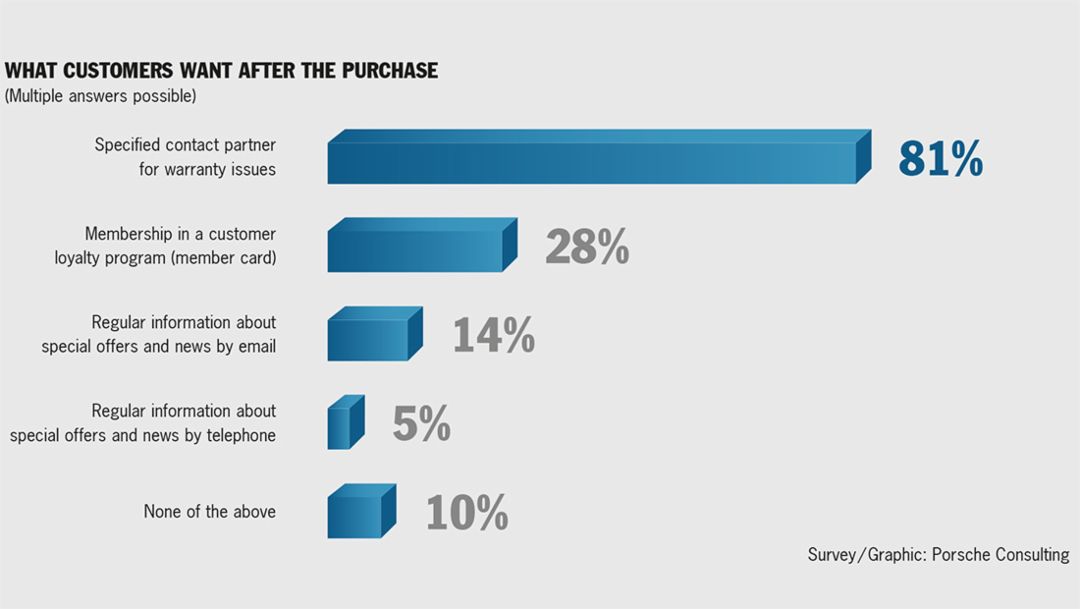Good service begins well before a purchase is made: 85 percent of Germans attach great importance to receiving personal advice when they are planning to purchase fairly large items – for example furniture, computers, or electrical equipment costing more than 500 euros. This was the conclusion of the latest survey which Porsche Consulting commissioned the opinion research institute Forsa to carry out on a representative basis.
But the way that the advice is provided is also important to customers: 74 percent are particularly keen to receive specific answers to their specific questions. And 58 percent feel better able to decide to make a purchase if they are also given the opportunity to have their special individual wishes catered for. By contrast, most people are not that bothered about receiving a personal recommendation from the salesperson along the lines of “I’ve got one too”: Just 36 percent consider such comments to be important.
And despite the widespread clamor to find the cheapest price, eight in ten customers would in fact pay more money to receive really good advice. If people are paying a price of 500 euros or more for a product, most of them would accept 20 euros or even more just for customized information from the manufacturer or retailer. This is indeed equivalent to at least four percent of the purchase price.
Vote in favor of the local retailer
Roughly one in two of the 1013 people surveyed appreciates the opportunity to test or try out a product before making a purchase. “This is a clear vote in favor of the local retailer. For it is very difficult for online suppliers to provide this service,” says David Blecher, head of the Service Excellence division at Porsche Consulting.
After the purchase has been made, good vendors can score even more points and turn new customers into regular customers if they also provide the right level of service: 81 percent of those surveyed aged 25 and above want to have a fixed person they can contact regarding any warranty claims. On the other hand, a customer card is much less important. Only 28 percent value such extras. Information sent by e-mail, for example concerning special offers or new products, is also only of interest to 14 percent of Germans. Contact made by telephone has now fallen right out of favor. Only five out of every 100 customers like receiving calls.
Anybody who wishes to make a complaint or raise a grievance after purchasing a product considers it unforgivable if manufacturers or retailers simply shun them: 93 percent of those surveyed bemoan problems in establishing contact as the biggest service weakness, closely followed by having to wait a long time for a response (89 %), a lack of understanding if problems arise (88 %) and bureaucratic handling of warranty claims (78 %).
Three quarters of Germans also reward courteous treatment
If a manufacturer or retailer does everything right before and after the purchase is made, there is a very good chance that its customers will recommend it to others. The Germans are particularly willing to promote companies in this way if the quality is right (85 %). But even if something does happen to go wrong, the vendor does not necessarily have to lose its good reputation: If it is willing to accept criticism from consumers and be accommodating when complaints are made, 75 percent of those surveyed will still be happy to recommend it to their friends or people they know despite the unfortunate mishap. Three quarters of Germans also reward courteous treatment from their initial interest through to making a repeat purchase from the same source. By contrast, only two out of every ten customers would dare to make a recommendation simply because a brand is well-known.
“The results of our survey reveal that above all else customers punish indifference after a purchase has been made. There are so many points of contact which retailers and manufacturers can utilize to establish long-term loyalty from customers. This does not even need to cost much money. For the best form of advertising is to listen properly and look after customers in the appropriate way. It is then possible for a lasting relationship to develop and both parties will benefit from this,” says David Blecher, who advises companies on their long-term customer management. He recommends that manufacturers and retailers should view the contact they have with the customer as being like a long journey with lots of stops: “Each stop provides the opportunity to establish contact and get closer. This is what customers really appreciate.”
The survey
To collect the data on customer satisfaction, a total of 1,013 German people aged 25 and above living in private households were surveyed by telephone from December 8 to 14, 2015. The participants were chosen by systematic random selection (multistage stratified random sample).
About Porsche Consulting
Headquartered in Bietigheim-Bissingen, Porsche Consulting GmbH is a subsidiary of the sports car maker Dr. Ing. h.c. F. Porsche AG, Stuttgart. Founded with a staff of four in 1994, it is now one of Germany’s leading consultancy firms and an international business, with over 370 employees and offices abroad in Milan, São Paulo, Atlanta and Shanghai. Our experts in operational excellence advise large corporations and medium-size companies worldwide in the automobile industry, aviation and aerospace, and mechanical engineering. Clients also come from the construction, consumer goods, retail and service sectors.




